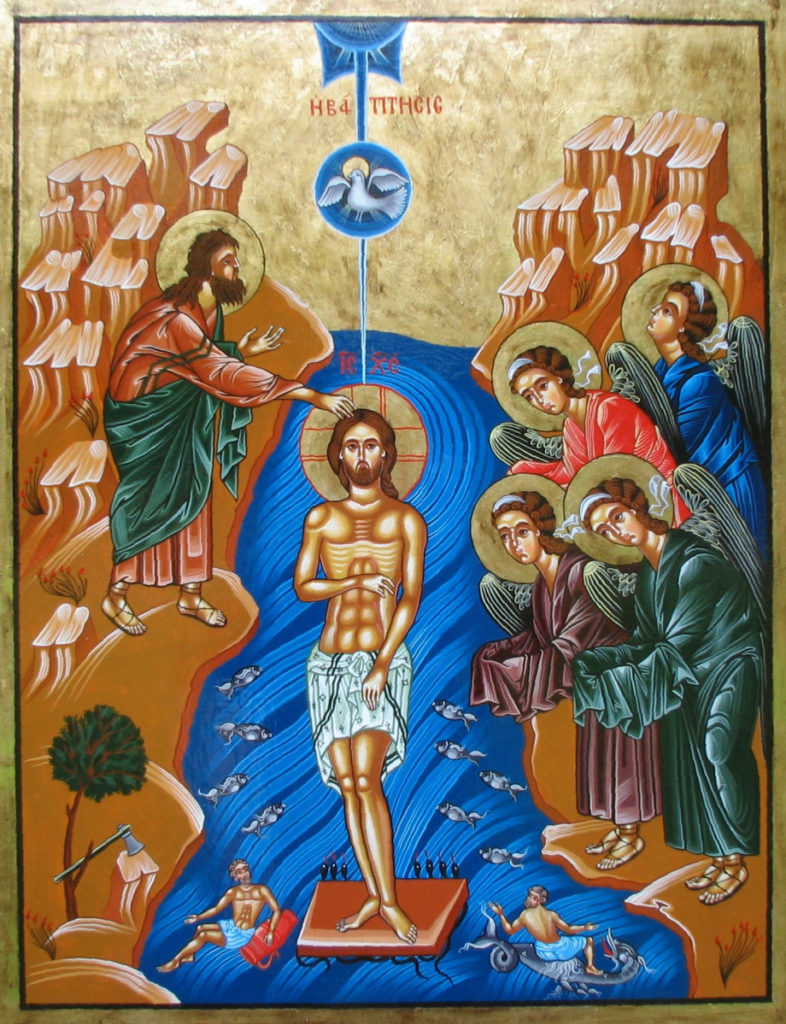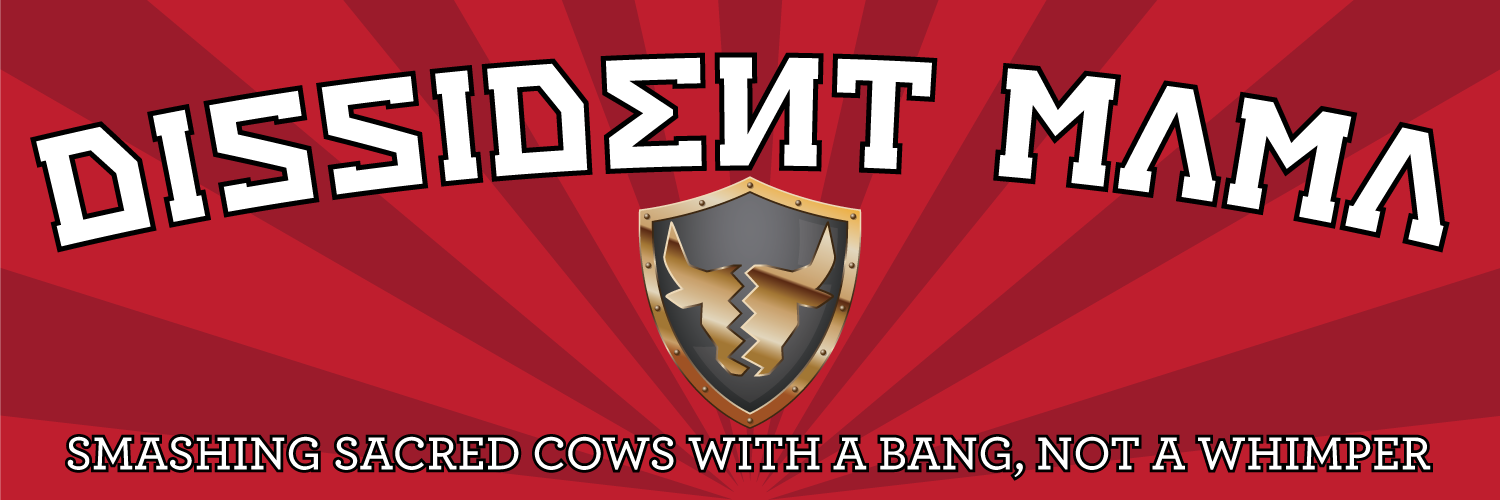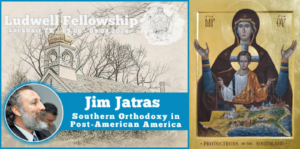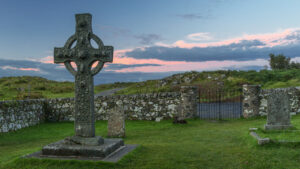Today, we Orthodox Christians remember the beheading of St. John the Forerunner. It is one of the six feast days for the devout man known also as John the Baptist, who was an ascetic, the cousin of Jesus, first preacher of the Kingdom of Heaven manifested by the appearance of Christ on the earth, the last of the Old Testament prophets, foreteller of the divine calling of the Gentiles, and universal apostle and first martyr of the New Testament.
One of my 10-year-old sons, Zeke, wrote a paper on John the Baptist last spring, so I thought I’d share it with y’all on this commemorative day. He does an outstanding job of illustrating John’s outspokenness for truth, both in life – such as his warning tax collectors and soldiers against the evils of extortion and plunder – and in death, when tradition says that John even descended into Hell, still preaching that the Messiah was coming and that all people had better prepare for the Kingdom of God through repentance and the rejection of selfishness.
It was obvious that John was on fire for the Lord. Jesus even described him as a “burning and a shining light.” Man, could we use a few more zealots like John today – fervent warriors for Christ, who emanate the love of God through word and deed, and hold the corrupt authorities’ feet to the fire. All good peoples should rejoice in honoring this “Angel of the Desert.”
I bid you a blessed day with this Orthodox prayer:
“Saint John, prophet and martyr, Thou who wast a blessing unto the righteous Elizabeth and a friend of Christ the Lord, teach us to repent that we may also be a blessing unto others and that we may prepare a straight path from this sinful world to the Kingdom of Heaven. Correct us if we stray from truth, deliver us if we fall into passions, and purify us if we love not our neighbor as Christ hath loved us. Baptist John, let us bring forth fruits worthy of repentance – fruits from the barren deserts and fruits from the dark forests which are transfigured only by reconciliation in Christ our God. We thank thee, O voice in the wilderness, for proclaiming the message of salvation unto all people. Amen.”

“The Lionhearted Preacher”
By Zeke Dillingham
Like a lion, John the Baptist roared the truth. In solitude, he lived wildly out in the desert. He was different. People thought he was strange. But he didn’t care. John was set apart in birth and in life. Valiantly, he protested important rulers who mistreated God. Since he was so determined in his mission, this would soon get him killed. Paving the way for the Lord, John the Baptist is one the Bible’s most prestigious heroes and should instill pride in all Christians.
John was a contemporary of Jesus, and he came to be known as John the Forerunner. John the Baptist was miraculously born to Elizabeth and Zechariah when they were both over 80 years of age. The archangel Gabriel surprisingly appeared to them and declared that they would bear a child who would be God’s messenger and they shall name him “John.” When Mary the mother of Jesus visited Elizabeth, John leapt in her womb. John’s parents both worked in the temple, so that meant he could’ve been a priest and led a comfortable life. Instead, he decided to go out in the desert because God had a special plan for him: to prepare the world for Christ and preach that God’s Kingdom would soon come.
John was a radical for God. He ate locusts. He devoured wild honey. He wore camel’s hair. Having been prophesied, he dressed and talked like Elijah. Throughout all of Judea, people came to him for advice and to be baptized. Courageously, John shouted to the sinister Pharisees and Sadducees:
“You are snakes! … You must do the things that show that you have really changed your hearts and minds. And don’t think that you can say to yourselves, ‘Abraham is our father.’ I tell you that God can make children for Abraham from these rocks. The ax is now ready to cut down the trees. Every tree that does not produce good fruit will be cut down and thrown in the fire.”
John, the miracle-born child, would soon become one of the most outspoken saints to walk the earth. “This is a voice of a man who calls out in the desert. Prepare the way for the Lord,” remarked the grand prophet Isaiah about John the Baptist. Amazingly, many prophets foretold about John, who was uncompromising and gallant. In the Old Testament, Malachi was one of the several who prophesied about John, while Elijah preached his same message: that all men should repent of their sins.
John started his ministry in 30 A.D. Jesus came to be baptized. John thought himself unworthy. Jesus insisted, so John agreed. When John humbly baptized Jesus, Heaven opened and God’s spirit came out in the form of a dove. A voice came from Heaven that proclaimed, “This is my Son and I love Him. I am very pleased with Him.” Jesus called John “the greatest of men.” John was divinely picked to be the one who would baptize the Son of God.
John the Baptist is an noble example for all Christians today. At the time of John’s ministry, Herod was the ruler over Galilee. Herod liked John. His evil wife Herodias didn’t. Breaking Jewish law was common for the couple, so John called them out, which enraged Herodias. Sadly, Herod promised her anything she wanted, so she demanded John’s head on a plate. John was bold and brave, preached the Good News, and dared to challenge sin. And for that, he was executed.
John invented baptism and Christians still do it today as a ritual. Isaiah explained that John would make straight the way for the Lord. Since John exemplified what it means to have both strength and humility, modern Christians should honorably revere him.
John, who was a herald for Jesus, deftly challenged corruption and chided sin. Like a soldier, John battled the enemies of God. During his mission, John explicitly influenced ancient people. He should be exalted by all Christians because of his resolute faith. Preaching that the Savior is coming, John got people ready for Jesus. Adroitly, he spread the message of separating “the good grain from the chaff.” If you get baptized and repent for your sins, you can have salvation. Truly, John was a lionhearted preacher.






Comments
I love History and discussions about the history of Christianity. In England,there is a great scholar by the name of Ralph Ellis,who has authored a number of books on the history of Christianity. The titles are available for purchase from a company named,Adventures Unlimited,located in Kempton,Illinois. There is an excellent online catalogue,freely accessible. The accounts that Ellis delineates are quite astounding. He points out that one of the most important figures in the early history of the Church of Rome was Iranaeus of Lyon. His works are still central to Catholic Thought. Iranaeus points out that Jesus was born in the 41 st year of the reign of Caesar Augustus,and died in the 3 rd year of the Emperor Trajan. Iranaeus is very emphatic about these statements,and brooks no arguments. Thus,according to Irenaeus at least,Jesus was born in the year 14 A.D. and died in the year 101 A.D.,at the advanced,yet not impossible,age of 87 years.
John the Baptist receives extensive coverage in Ellis’ works.The familiar statement about,” camel’s hair ” is shown to be a reference to,” cloth of Egypt ” as ” Kam ” was the appellation of Egypt in the ancient world. Cloth of Egypt was of ultra-fine quality and was spectacularly expensive,with its consumption being relegated strictly to the aristocracy and the wealthy upper classes. The Greek word for, ” locust ” had an additional meanings of, ” the top of the plant [ where locusts perched ] ” , ” the ” top of the heap ” , ” the peak of the market ” . In ancient Judea,only Jews paid tithes,and all tithes paid by Judean Jews took the form exclusively of agricultural produce – foods for the priests to eat. Crops scooped off from the top of the heap were understood to be the choicest of the whole lot,and so,quite fit to be taken to the receiving priests as agricultural tithe-tributes. He ate from – ” the top of the heap ” . He ate from – ” the very peak of the market ” .
To read Ralph Ellis’ books is something of a dramatic experience for any enquiring mind. Ralph Ellis is a great scholar. I myself cannot do justice to his monumental scholarly works with just these few momentary recollections ” off the top of my head ” , without documentary references or anything like that.
Author
Joseph, I’ll have to look into Ellis. His stuff sounds fascinating. Indeed, I too love taking deep dives into history to look below the surface. It’s always so much more interesting and fruitful than the conventional “wisdom.”
I am a tiny bit familiar with Irenaeus and his works “Against Heresies,” in which he preached and wrote against the trouble-making Gnostics of his day, as well as put the agitating Marcions in their place. I think he was also one of the first Christian scholars to discuss the principle of Apostolic Succession, which is a big deal for us Orthodox.
And Irenaeus, like John the Forerunner, was unapologetic for his faith, and used his heart and his mind to battle the evil of his time. “Repent of your sins and turn to God, for the Kingdom of Heaven is near,” John the Baptist said. Easier said than done, sometimes more than others, but it still doesn’t change the fact that it’s eternal truth. That’s why we lean on the saints like John and Irenaeus to guide us. We modern Christians aren’t reinventing the wheel; we just need to stop jabbing a stick into the spokes and take heed of our Church history, traditions, and the teachings of our devout ancestors.
Thanks so much for reading and commenting, good sir. God bless!